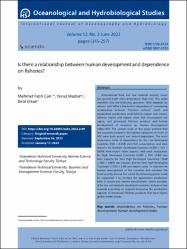Is there a relationship between human development and dependence on fisheries?
Künye
Can, M.F., Mazlum, Y., Erkan, B. (2023). Is there a relationship between human development and dependence on fisheries?. Oceanological and Hydrobiological Studies, 52 (2), pp. 245-257. https://doi.org/10.26881/oahs-2023.2.09Özet
International food and raw material security issues has gained much more importance than ever. This study examines that the following questions 'Who depends on whom?' and 'What is the level of dependency?' considering relationships between " fisheries context" (catch and aquaculture production, total fisheries export and import, fisheries export and import value, fish consumption per capita, and processed fisheries product) and human development of countries (as Human Development Index-HDI). The overall result of the study pointed that the countries located in the highest categories in terms of HDI were both export and import-dependent. The most importance levels of dependency for the Low Developed Countries (HDI < 0.550) were fish consumption, and total imports; for Medium Developed Countries (0.550 = HDI < 0.699) were export value, exports, and catch production; for High Developed Countries (0.699 = HDI <0.80) was total exports; for Very High Developed Countries-I (0.80 = HDI < 0.900) was exports; and for Very High Developed Countries-II ( HDI = 0.90) was import value. To improve the human development of the countries and maintain the food security around the world, the following points could be suggested: i) to increase the aquaculture production both in inland and marine environments where possible, ii) for low and medium developed countries, instead of raw material exporting, to support increasing the production capacity of processed fisheries products that have higher global market prices.
















